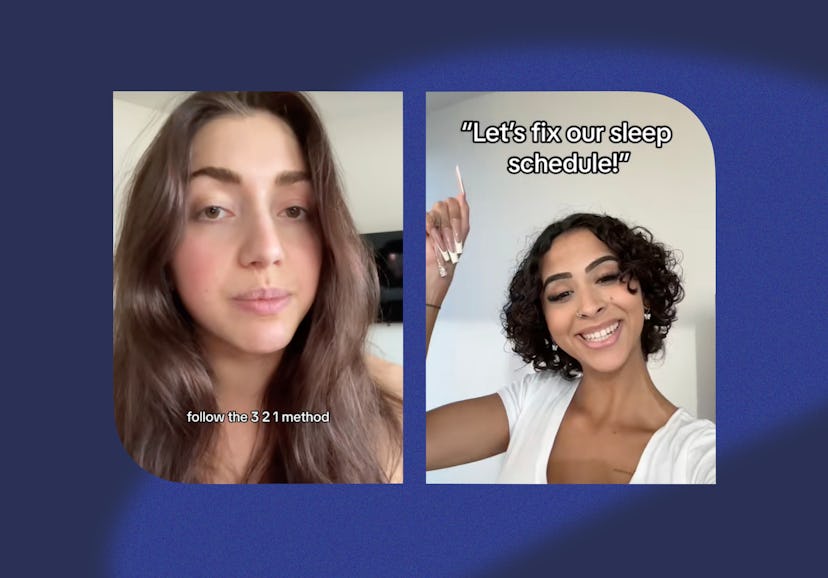Wellness
The Viral "3-2-1 Method" Might Help You Fall Asleep Faster
It’s basically a checklist for better Zs.
While it would be amazing if you could count down from three and instantly conk out, that’s not what the viral 3-2-1 sleep method is about. Instead, this hack recommends three easy changes to make before bed so that it’s easier to fall and stay asleep, and it’s showing up in wellness roundups across TikTok.
In a popular clip, Dr. Karan Rajan, aka @dr.karanr, explained how the 3-2-1 sleep method works. Three hours before bedtime is when you should stop having big meals, lots of liquids, and alcohol — three things that can mess with your sleep. Two hours before bed is when you need to stop working, so no emails, texts, projects, etc. And one hour before bed is when you need to stop looking at screens.
The rules are easy to remember — a simple three, two, one — but not everyone likes them. In his comments section, one person said, “Me watching this at 1 a.m. when I’m supposed to be asleep.” Others worried it would be hard to snooze without a screen, like this commenter who wrote, “But I can’t fall asleep without watching YouTube...”
Others were all about it and excited to give it a try, and one commenter even said, “Give me a book and a melatonin and I’m gone.” Here’s what to know about the 3-2-1 method, according to a sleep expert.
What Is The 3-2-1 Sleep Hack?
According to Dr. Chelsie Rohrscheib, a neuroscientist and sleep expert with Wesper, a research-backed sleep improvement site, this pre-bed routine is all about providing your body and mind with the best conditions for good quality sleep. Here are the rules:
- Three hours before bed, stop eating heavy meals and consuming alcohol or caffeine. If you plan to sleep by 11 p.m., that means you shouldn’t make dinner or have a coffee after 8 p.m.
- Two hours before bed, finish all work or mentally stimulating activities. Send that last email by nine.
- One hour before bed, turn off your screens and begin a relaxing bedtime routine. Play music, read a book, meditate, do a crossword, or do some light stretches.
Rohrscheib says these tips are all part of good sleep hygiene, which can also include turning down the temperature in your room, tidying up, and dimming the lights. If you can’t do it all, going for the 3-2-1 rule is often enough to ease into bed mode.
Why The 3-2-1 Sleep Hack Works
Even though it’s tempting to house a heavy meal right before bed, Rohrscheib says lying down after a big meal can lead to things like bloating, stomach discomfort, and heartburn. It can make it tough to get comfortable, and even tougher to stay asleep through the night.
If you worry about going to bed hungry, she says it’s more than OK to have a small snack. “Prioritize foods with lots of fiber, protein, and a low glycemic index,” she says. “These foods help to stabilize blood sugar, make you feel satiated, and are less likely to cause discomfort.”
While lots of people take a glass of water to bed, this hack recommends not drinking too much. According to Rohrscheib, the body releases hormones at night to reduce your need to pee, but it’s no match for giant glasses of water. If you want to sleep through the night without having to get up to go to the bathroom, it might be worth a try.
Of course, putting your stressful work away is a necessary part of winding down before bed, and the same is true for stashing your screens far away from your pillow. “The circadian rhythm, aka your brain's 24-hour internal biological clock that dictates when you’re awake and when you’re tired and asleep, is regulated by the hormone melatonin,” she says. “Blue wave spectrum light emitted by electronic screens enters your eyes and suppresses melatonin production, which tricks your brain into thinking it's daytime.”
It is soothing in the moment to scroll or watch a movie, but it could also be the reason why you lie awake late into the night.
The Takeaway
If you’ve been struggling to fall asleep, the 3-2-1 method might be your new best friend. Not only will it help you develop an ideal pre-bed routine, but it should also make it easier to fall and stay asleep.
Source:
Dr. Chelsie Rohrscheib, neuroscientist, expert with the research-backed sleep site Wesper
